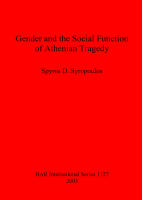Description
This study aims to re-examine Greek tragedy in order to find out how it influenced and determined the attitudes and perceptions of Athenian citizens. Greek tragedy covered many cultural issues, but this study is concerned centrally with how tragedies portrayed women on stage, and how these portrayals were interpreted by audiences who were used to regarding women as second-class citizens. All of the information we have today about Greek women comes entirely from male sources, so this means that we know only of how women were perceived by Greek men, not how they perceived themselves. Subsequently this study cannot directly reveal much at all about Greek women, but it can reveal a great deal about the society in which they lived and how it regarded those women. Importantly, therefore, Syropoulos focuses this study’s emphasis onto the social function of tragedy and its relevant ideological and cultural importance. The period of study of this thesis stretches from Aeschylus’ first play to Euripides’ last (c500-405BC), and this is an important period of time for Athens as it is widely regarded as the time in which its culture was generally defined. These three main tragedians all held the belief, according to Syropoulos, that stepping outside of one’s gender boundaries, which is a major gender theme amongst Greek tragedies, is generally harmful. This trend is shown in many of these plays, and implies that this was the general consensus amongst Athenians at this time. Syropoulos therefore classifies tragedy as a sort of ‘cultural propaganda’, in the sense that it was meant to keep society in balance because of the fact that gender-differentiation was an important basis for Greek culture.











